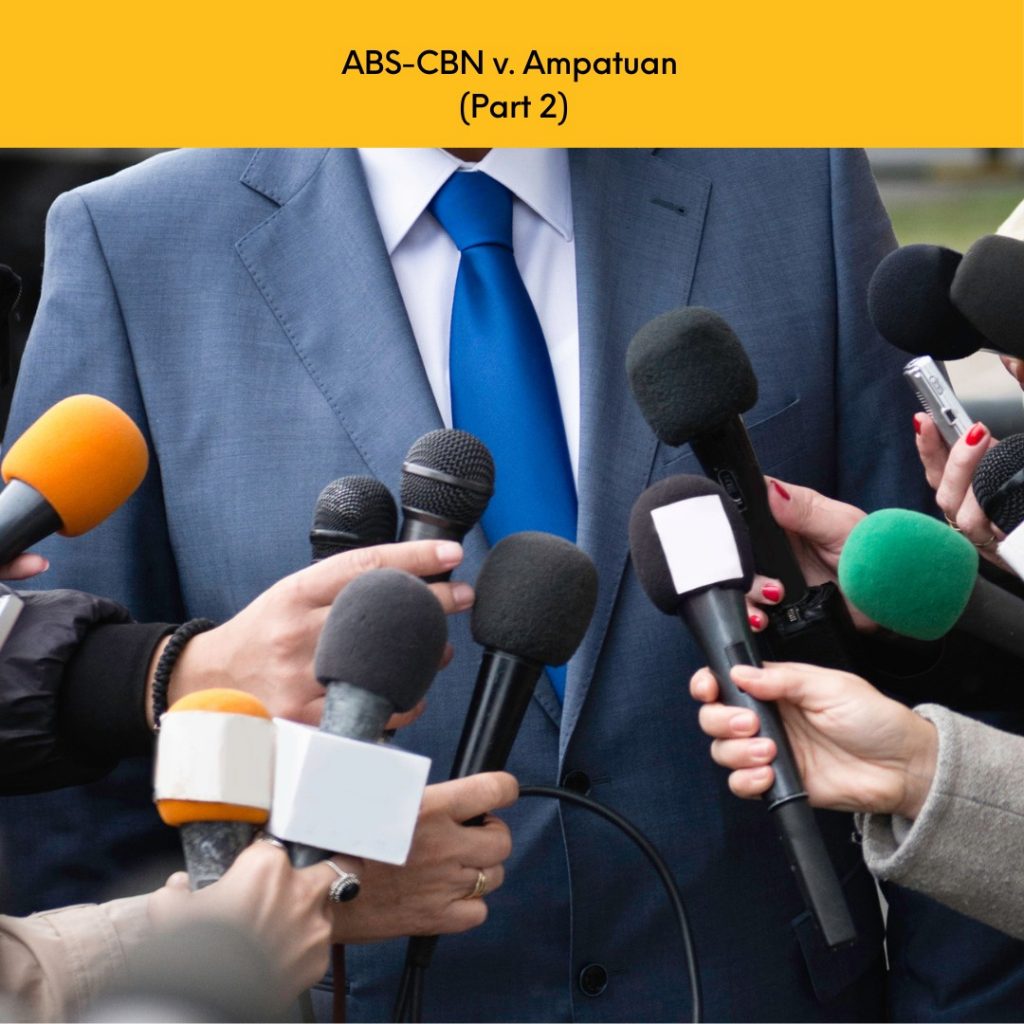
Published 29 January 2024, The Daily Tribune
In continuation of the previous article which discussed the case of ABS-CBN v. Ampatuan (G.R. 227004; 25 April 2023), the Supreme Court discussed the concepts and guidelines citing a person in contempt vis-à-vis the sub judice rule.
To recall, in 2010, ABS-CBN reporter Jorge Cariño interviewed Lakmodin Saliao who narrated that he was present when the Ampatuan family planned the Maguindanao Massacre. Saliao named the Ampatuan family members who were present at the meetings. He also discovered that he was about to be killed for knowing too much about the Massacre. Saliao’s interview was aired on ABS-CBN’s TV Patrol.
The airing of the interview prompted Andal to file a petition before the RTC to cite Saliao, ABS-CBN, and Cariño for indirect contempt, claiming that Saliao’s interview was “calculated to interfere with court proceedings to serve Saliao’s own interest without passing through the scrutiny of the police [sic] of the National Prosecution Service…”
Andal’s petition was dismissed for failing to state the second and third requirements of a Petition for Indirect Contempt. The relevant mental element to prove the existence of actual malice or deliberate or reckless disregard of the truth or falsity of the statement was not stated.
Neither was there sufficient allegation of the clear and present danger of the interview and its broadcast to the court’s administration of justice. Considering the Petition failed to state all the required allegations for violating the sub judice rule, the Court dismissed the Petition.
The Court, however, noted that had Andal’s petition sufficiently stated a cause of action, specifically all the required allegations, ABS-CBN and Cariño would have been guilty of indirect contempt in interviewing and broadcasting Saliao’s statements which are relevant in the pending criminal cases before he was even presented in court.
First, the Supreme Court held that an examination of the transcript of ABS-CBN’s broadcast of Saliao’s statements shows that they represented Saliao’s statements as his testimony which was claimed to be his personal knowledge directly bearing upon the guilt of Andal in the pending criminal cases.
Second, the Court held that ABS-CBN and Cariño usurped the role of the courts in receiving Saliao’s testimony by allowing the latter to state matters of his personal knowledge relating to the murders on national television. The Court added that at the time the interview aired, the criminal cases were already undergoing pre-trial.
According to the Supreme Court, there was also no showing that ABS-CBN and Cariño secured leave from the prosecution to air the interview, notwithstanding the relevance of his statements to the pending criminal cases.
Third, the Court found that while ABS-CBN and Cariño are correct in claiming that Saliao’s statements are matters of grave public concern to which the press may give publicity, the Court held that they should not have presented Saliao as a witness on national television.
According to the Court, “[t]he use of the term testigo in Saliao’s presentation to the public removes the distinction between media interviews and witness presentations in open court.”
Finally, the Court found that “Cariño ended the interview in a manner that bolstered the truth of Saliao’s statements, again characterizing the interview as testimony.”
The Supreme Court stressed that the public interest character of Saliao’s statements is not an excuse to disregard the sub judice rule. The Court emphasized that it is especially true in criminal cases pending before the courts.
The High Court reminded everyone that responsible journalism is said to be the “handmaiden of effective judicial administration, especially in the criminal field. The [sic] does not simply publish information about trials but guards against the miscarriage of justice by subjecting the police, prosecutors, and judicial processes to extensive public scrutiny and criticism.”
According to the Supreme Court, “[t]he rationale of the sub judice rule is to protect against the dangers of the publication to directly influence a judge or indirectly through public opinion in resolving a particular case.”
It added that while the right to free speech includes the right to know and discuss judicial proceedings, this does not include statements that are aimed at influencing judges in deciding a pending case.
For more of Dean Nilo Divina’s legal tidbits, please visit www.divinalaw.com. For comments and questions, please send an email to cabdo@divinalaw.com.

